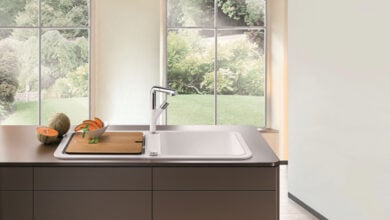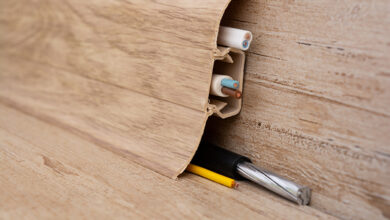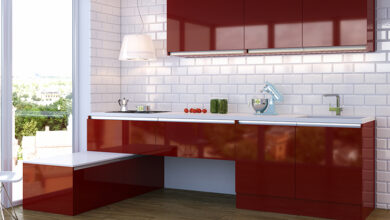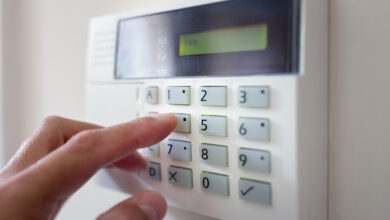How much does a new bathroom installation cost?
The prices in this cost guide are accurate as of 2025*

Your bathroom is one of the most important rooms in your house. You want to be able to relax in the bath after a long day of work, but you also need a practical space to get ready when you’re rushing in the morning. It’s not surprising that 13% of homeowners completed a new bathroom installation recently, because a new bathroom can significantly improve your quality of living.
Perhaps you’re tired of using the same old bathroom that came with your house when you first bought it. Maybe you’re looking to renovate, by adding a bathtub or some new tiling. Not to mention that renovating and extending your bathroom suite can increase the value of your property by up to 5%. These are all good reasons to start researching what your budget might look like for a new installation.
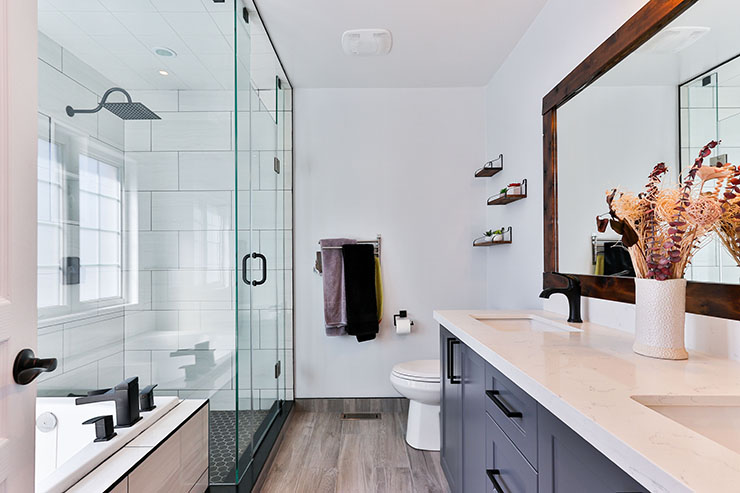
To help you figure out the cost of renovating your bathroom, first have a think about:
- Do you want to fully tile your bathroom, or just go to half height?
- What type of shower enclosure do you want?
- Do you need a bath installed too?
- What style of toilet do you want?
- Will you need a towel radiator?
On average, a new bathroom will cost you around £14,000, (between £12,000 and £16,000), depending on the size of the suite. These prices include VAT, as well as the cost to rip out and dispose of your old suite and appliances. Your bathroom fitters will do all the necessary plumbing, tiling, painting and electrics. These prices also include the cost of the materials for your new bathroom suite, with an allowance of roughly £2,200 for materials and £1,100 for bathroom tiles. However, how much you will end up spending on appliances will depend largely on the quality of the materials you choose to buy.
All of these prices can be affected by additional costs due to extra plumbing, heating, and flooring requirements. This is why hiring skilled tradespeople to install your flooring, taps, tiling, or anything else you might need is really important. You might think you’re going to save money by doing a bit of DIY, but bathroom installations are complex, and in the long-run, hiring a professional bathroom fitter will save you time and money.
Expect to pay more if you live in London and the South East, where cost of labour can rise by up to 20% more on average.
This guide breaks down the costs of all the bathroom renovation projects you could complete:
How much should a bathroom renovation cost?
The average cost of renovating a bathroom is around £14,000 (between £12,000 and £16,000).
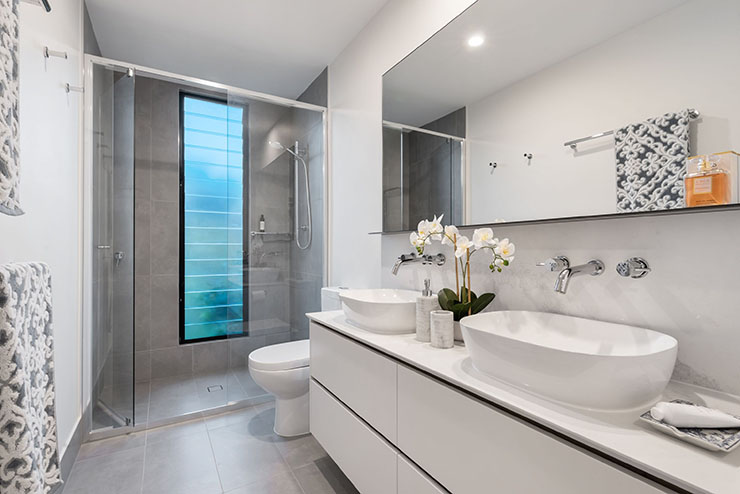
How much you spend will depend largely on the size of your bathroom. A small, 2m x 2m bathroom will cost you roughly £12,100 to have installed. On the other hand, to renovate a mid-sized bathroom (for instance a standard 3m x 3m), you might be looking at a bill of around £13,100. A large 4m x 4m bathroom could cost around £16,000.
How much you end up spending on the installation of your bathroom suite will depend on where you live in the UK, as cost of labour can rise by up to 20% more in London and the South East.
As part of your installation, you can expect your tradespeople to:
- Completely rip out and dispose of your old bathroom suite and appliances
- Fit your new suite and appliances
- Complete all necessary plumbing and electrics
- Tile and paint your new bathroom suite
The above prices also include the cost of purchasing the appliances for your new bathroom. We have allowed for roughly £2,200 for fitments, and £1,100 for bathroom tiles. However, how much you end up spending on appliances will depend on the quality of the materials you choose to buy.
Not including the cost of materials (but including VAT), the installation of your new bathroom could cost you around:
- £8,150 for a 2m x 2m
- £10,000 for a 3m x 3m
- £12,150 for a 4m x 4m
A bathroom installation can take as little as four days or as long as three weeks to complete. This time frame depends on whether you hire a single plumber to do the job (which is cheaper but takes longer), or a team of tradespeople (which is more expensive but faster), and how big the project is.
This year, bathroom fitting and tiling are in high demand. If you’re looking to renovate the bathrooms in your house, post a job on Rated People and get matched with skilled tradespeople as soon as possible.
Expect to pay between £800 and £3,000 for new bathroom materials, but the top end is almost limitless.
Bathroom materials can range in price, from the cheapest acrylic products, to more expensive steel, iron, and stone materials. You could technically spend £25,000 on an 18-karat gold layered toilet seat. It all depends on your budget…
The below prices do not include installation costs.
Cost of bathroom materials in 2022
| Material | Low-end | Average | Luxury |
| Bathtub | £100 | £300-700 | £800-3000+ |
| Sink | £50 | £100-300 | £300+ |
| Shower | £70 | £200-400 | £600-2,000+ |
| Shower enclosure | £50 | £250 | £550+ |
| Toilet | £50 | £200 | £500+ |
| Taps (per pair) | £30 | £50-100 | £100+ |
| Tiles (per m2) | £25 | £50-100 | £100+ |
| Radiator | £40 | £100 | £200+ |
There isn’t an average upper limit of how much you might spend on bathroom materials.
Close section ↑Expect to pay anywhere from £750 and £900 to have your old bathroom stripped and disposed of.
If you’re installing a new bathroom from scratch, then this won’t apply to you. But if you are renovating an old bathroom with new materials, then you will have to consider an additional removal fee.
Removal cost factors in the price of removing old bathroom tiles, hiring a 6 yard skip, and the labour cost of stripping your old bathroom suite and disposing of your old bathroom materials.
You could pay around £750 to strip and dispose of a 2m x 2m bathroom, whilst a large 4m x 4m bathroom would cost around £900 to clear out. A medium, 3m x 3m strip and removal could cost around £830.
You may also need to hire a post construction cleaning specialist, so check what is included in your package when you hire your builders.
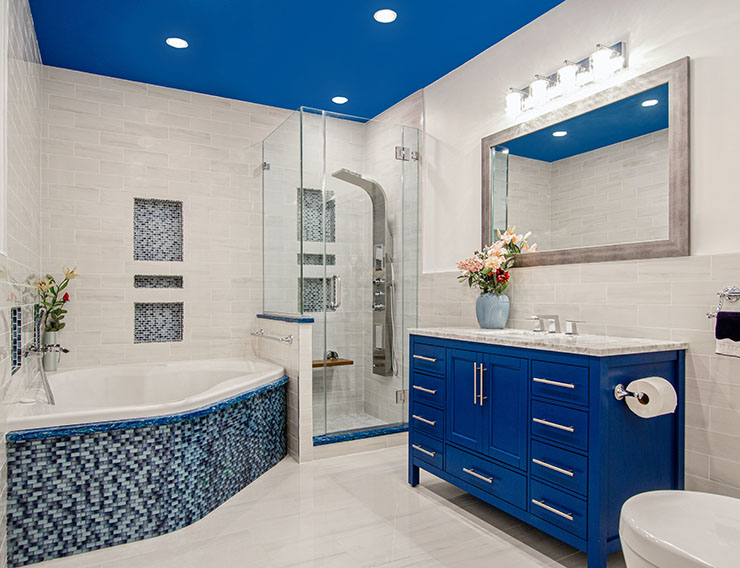
How much does it cost to tile a bathroom?
To determine how much you’ll need to budget for your bathroom tiles, consider how big your bathroom is, and the quality of tiles that you are looking to buy. This is because you’ll need to factor in labour costs and the quality and quantity of tiles you’ll need to purchase.
Also, keep in mind that wall tiles are less expensive than floor tiles, and that you also need to think about the backing material you want to use, such as grout or adhesive.
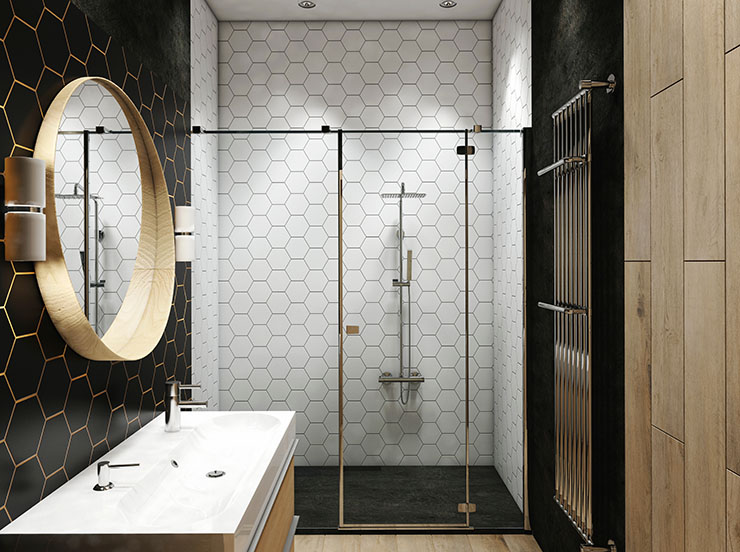
1. Cost of materials
Really cheap ceramic tiles can cost as little as £15 per square metre, whilst you could be looking at £70-150+ for better quality granite or glass tiles. A mid-range tile can cost you about £50 per square metre.
We recommend that you purchase at least 10% more tiles then you estimate needing, to account for errors or damage that might occur during installation. If you don’t end up needing them, you could repurpose your excess tiles for a DIY project, such as revamping an old bookcase or coffee table. Otherwise, why not use them as coasters, or turn them into a tile table runner? Get creative with your extra tiles, both to avoid waste and to make the most of your money.
Some general prices for tiles, according to material (per m2), include:
| Ceramic | £15-50 |
| Marble | £40-70 |
| Quarry | £20-30 |
| Terracotta | £50-60 |
| Limestone | £50-80 |
| Porcelain | £50-100 |
| Glass | £110-160 |
| Quartzite | £70-100 |
| Slate | £40-50 |
| Granite | £80-90 |
An average allowance for the supply of bathroom tiles is of around £1,100, though this will range according to your choice of materials.
Tiles come in different sizes. Standard ranges include:
- Small (20cm x 20cm)
- Medium (45cm x 45cm)
- Large (64cm x 64cm)
- Extra Large (90cm x 90cm)
Whatever you decide to opt for, we recommend you talk to your tiler before you buy your materials. They will be able to recommend the best products, designs, and sizes, according to your creative vision and the layout of your bathroom.
2. Labour costs
Labour costs will be determined by where you live in the UK, as well as your choice of pattern for your bathroom tiles. It will cost you more to lay your tiles in an elaborate pattern, so keep this in mind when choosing the design for your tiles. It will also cost more to tile around things, such as a sink, shower, doors or windows.
For a 2m x 2m small bathroom, you can expect to spend roughly £1,500 in labour costs to lay your bathroom tiles. This price will go up to roughly £2,350 for a 3m x 3m, whilst a large, 4m x 4m bathroom will cost around £3,400. This does not include the cost of removing old tiles, but does include the cost of the grout and adhesive required to complete the job.
A professional wall tiler can take between one and five days to complete the installation, depending on the size of your bathroom, and your choice of pattern. Request a quote to find out exactly how much you will need to budget to have new tiles installed in your bathroom.
When you combine labour and material costs, a small 2m x 2m bathroom could cost around £2,600 to tile. For a medium 3m x 3m bathroom, you could expect to pay around £3,450. Lastly, a large, 4m x 4m bathroom could cost around £4,500. How much you end up spending to purchase and fit new tiles will depend on the quality of your materials, and where you live in the UK.
Otherwise, some alternatives to tiles include:
- Bathroom wallpaper
- Bathroom wall panels and cladding
- Painted walls
- Half tiled, half painted
How much does it cost to have a shower installed?
Buying and installing a new shower costs between £350 and £600.
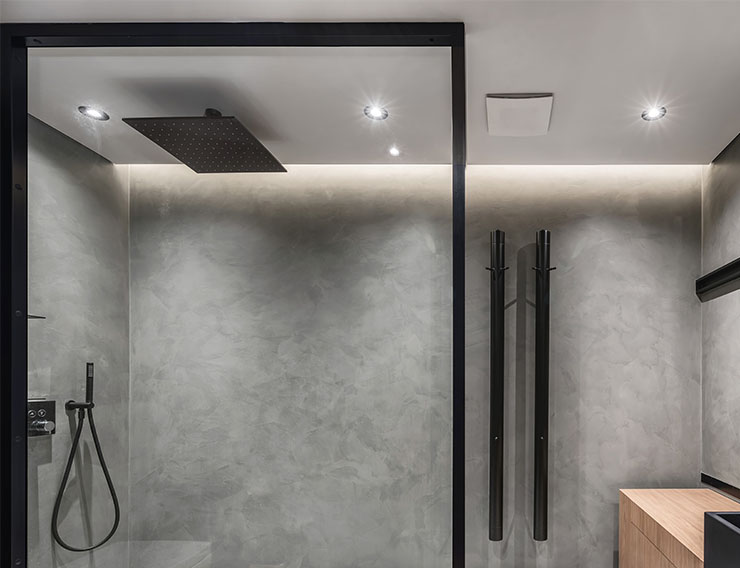
When it comes to installing a new shower, you will need to consider the cost of the shower itself, and then the cost of an enclosure. Most people prefer to spend a little more on the quality of their shower, and if you enjoy taking long showers as you sing along to your perfectly curated playlist, then you probably should too. Especially if you’re a shower over bath kind of person.
The type of shower you settle on will depend on the plumbing in your bathroom. A plumber can definitely help you pick the best option for you. Whether you want a simple, minimal showerhead with a single valve, or a three-way mixer with head, hose, and body jets, we recommend you opt for a thermostatic valve. These valves have built-in thermostats that keep your water temperature constant, even if somebody opens a tap somewhere else in your house whilst you’re showering. With a thermostatic valve, you can say goodbye to those sudden cold-water shower shocks.
Low-end showers can be as cheap as £70 whilst higher-end showers, such as a power shower or designer waterfall showers, can cost upwards of £800. Power showers are some of the most expensive models on the market because they offer great water pressure, due to an integral pump that boosts flow rate. Before you buy one, make sure your boiler is compatible with a power shower, as they only work with specific boilers.
Electric showers are another affordable option. Budget electric showers cost around £200, whilst high-end, deluxe feature electric showers cost about £700 to supply and fit. Cheaper electric showers can save you money, but might leave you feeling dissatisfied due to low power. Pricier models, on the other hand, deliver a fairly hefty output.
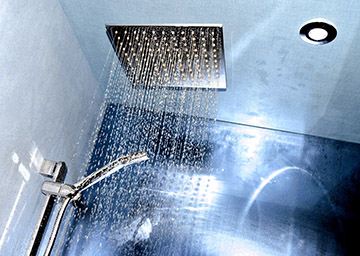

area with very hard water
Shower enclosure costs
Whether your shower is built into the bathtub, or is separate, you will have to consider shower screen costs on top. These can range from £50 to £250+. The most important decision when it comes to the right enclosure for you is the type of door you want for your shower. You could go with frameless, hinged, sliding, bi-fold, curved, pivot, or even no door at all. Your choice should be determined by the type of bathroom you have.
If you then include installation costs, on average, buying and fitting a shower and enclosure will cost you between £350 and £600. The fitting itself usually takes a couple of hours to complete (in the case of a renovation) or about eight hours for a completely new installation.
Lastly, if you have the money and space for a wet room, and are looking to have one installed, then you’ll need to budget at least £4,000. High-end wet rooms can cost up to £12,000 to supply, with an average installation cost of £250 a day. It should take between four and seven days to install a wet room.
Close section ↑How much does it cost to have a bathtub installed?
On average, a standard bathtub will cost you between £500 and £1,300. This price accounts for the cost of buying a new bathtub, which usually ranges from £300 to £700. It also includes the cost of installation, which depending on a range of factors, will cost between £200 and £600.
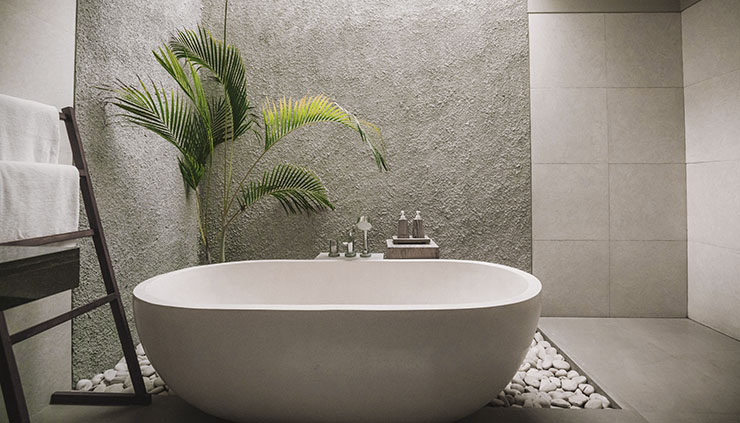
A simple acrylic bathtub can be as cheap as £100 to buy, or even less. Freestanding bathtubs tend to cost around £300, whilst heavier marble bathtubs can cost upwards of £11,000.
Cast iron baths are considered the best of the best, because they’re the most durable, resistant to dents, scrapes, and scratches. Cast iron is also great at retaining heat. However, because they’re so heavy, they’re often harder and more expensive to install. Though you can find some on the market for around £800, they usually cost upwards of £1,200 to buy.
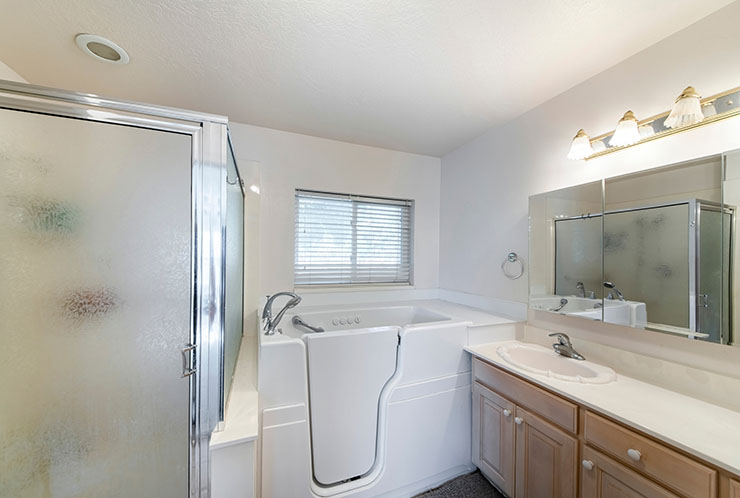
Other things that can impact the price of a bathtub is whether or not you are looking to buy a walk-in bathtub – should a member of your household have accessibility problems – or a whirlpool bath with potential hydrotherapy benefits. These tend to cost upwards of £1,200.
When you add in installation costs, you can expect to spend about £900 to supply and fit a standard bathtub against two walls, but raise that price if you’re looking to fit something a little fancier. On average, a luxury bathtub (for instance a cast iron freestanding bath) will cost about £1,600 to buy and install.
Are you still unsure about which bathtub to buy? A basic steel bathtub is considered the best value-for-money option, and might be a good fit. These start from about £120.
It usually takes between three and five hours for a professional to install a bathtub.
Close section ↑Cost to replace a toilet?
The average cost to buy and install a new toilet is between £300 and £350. How much you end up spending on your toilet will depend on where you live in the UK and the quality of your materials, which can range in price and style.
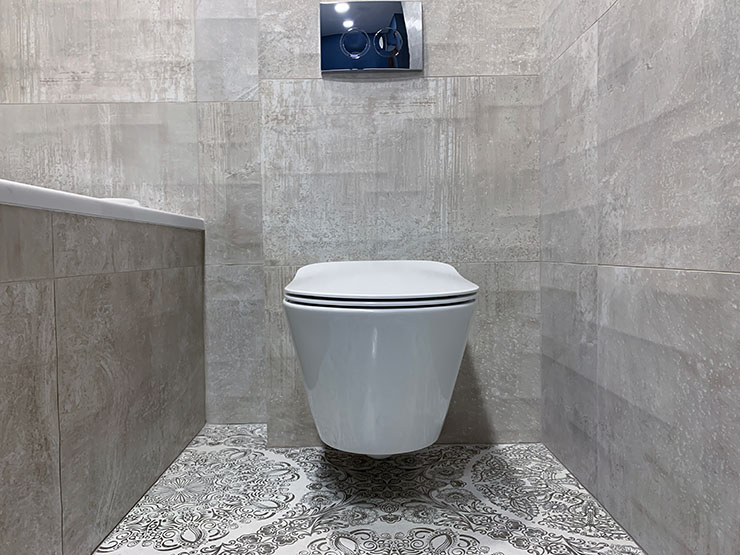
Most people aren’t too fussed about buying a high-tech, £1,000 Japanese toilet seat. Especially when you can save serious money by buying a cheaper option, that starts from around £50 for a basic floor-mounted pan.
For mid-range level prices, you could be looking at a cost of around £200. Practical but durable, these are the most popular and most bought toilets. Some notable brands include Armitage Shanks, Roca, and Ideal Standard.
More luxurious toilets tend to cost £300+, ranging up to £500. An example of a more expensive toilet installation is the wall hung toilet. Wall hung toilets are easier to clean, and like back to wall toilets, can give your bathroom a more contemporary feel.
However, because the cistern is hidden in the wall, you will need a wall frame during installation, so it will cost more to fit, usually around £300. As a result, these are often recommended for new bathrooms rather than toilet replacements, though if you can afford to budget for one, it can make your bathroom look bigger than it actually is.
Usually, a toilet installation takes between two and three hours, with a simple, standard toilet installation costing around £300. However, you should price this up if there is a more complex installation involved, and adjust prices according to where you live too. This doesn’t factor in the cost of removing your old toilet, which usually incurs an additional cost of about £70.
Close section ↑How much does it cost to install a new bathroom sink?
Buying and installing a new sink could cost you around £480.
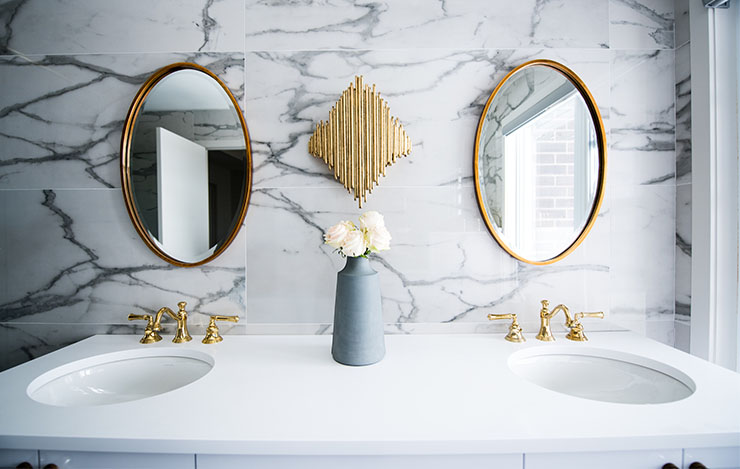
A bathroom sink can cost as little as £50 to buy, for low end pedestal basins. These options are popular because they are fairly easy to fit and cheap to buy. If you have a small bathroom, however, a pedestal basin might not be the best choice, since they stand on the floor and take up a lot more space.
Also affordable, wall-mounted or semi-pedestal basins will maximise your space, whilst giving your bathroom a modern look. However, they do cost a little more than standard pedestal basin models, so make sure you think about how big your budget is for your bathroom basins.
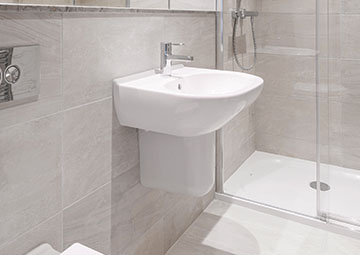
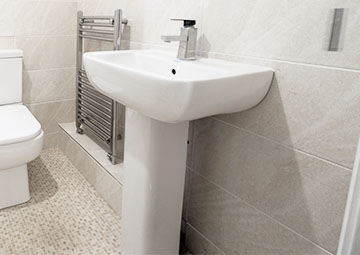
Vanity basins are more expensive, with mid-range basins costing between £100 and £300 (not including the vanity units, which you will need to buy separately). Luxury basins start from £300 and beyond.
This cost depends on the model of your basin, but also on the material it’s made from. Look out for ceramic basins if you’re on a budget, as these are the most affordable yet durable option. Glass, stone, and stainless steel materials will inevitably cost you more, but will also be more hard-wearing. At the top end, a marble basin can give your bathroom a classy look, but you will have to part with a bit more money for such a premium, resilient material.
The installation itself can cost as little as £200 or upwards of £500, depending on how complicated the installation is. If you are replacing a basin (like for like), then the fitting should be straightforward and relatively cheap. If, on the other hand, your new basin installation requires pipework changes, then you will probably have to pay a bit more.
A standard, single pedestal basin will likely take roughly one to two hours to install.
Close section ↑How much does it cost to fit new bathroom taps?
Buying and installing a pair of taps will cost you roughly £220.
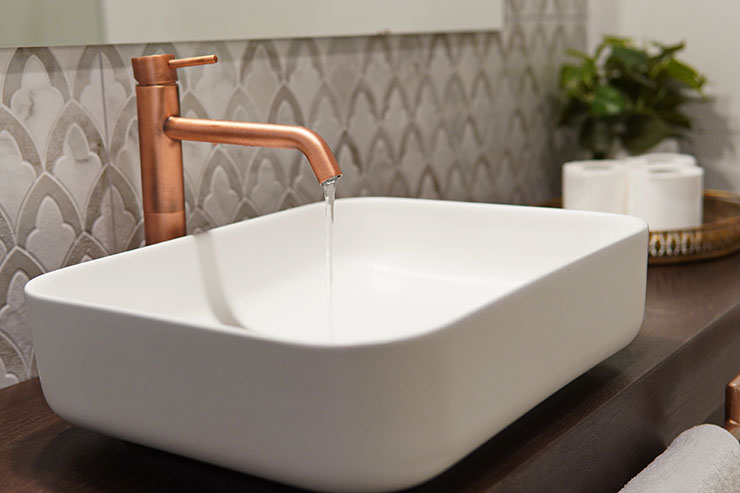
Often, simply changing the taps in your bathroom can make it seem brand new. In fact, new taps can be fairly cheap, so making such a simple change to upgrade your bathroom is a real no-brainer.
Bathroom taps come in a range of prices:
- Low end taps (set of two): £30-50
- Mid range taps (set of two): £50-100
- Luxury taps (set of two): £100+
Basin-mounted mixers are the easiest option to have installed. Mixer taps control both hot and cold water as a single, mono tap, and when installed directly into the basin are a simple and cost-friendly solution.
Or, you could choose to buy some wall mounted taps. These would elevate the design of your bathroom, but require more plumbing work. Wall taps need hidden plumbing in the wall, which will make installation trickier and more expensive too.
Just like with your shower, you can also get thermostatic basin taps that regulate temperature, keeping your hot and cold water steady regardless of who else is opening taps and showers in your house.
A set of taps takes under two hours to install, with a cost of around £100 to replace a set.
Replacing a set of taps may seem simple to do, but if you want to avoid damaging your plumbing, hiring a professional tradesperson is a good idea. Find the right fit for you on Rated People.
What is the cost of installing underfloor heating?
The average cost of installing underfloor heating in your bathroom is £800 – £1,000.

There is nothing worse than getting out of a hot shower and into a freezing cold bathroom. If you want to avoid shivering in your towel as you rush to get your clothes on, then underfloor heating might be the perfect solution for you.
When renovating your bathroom, underfloor heating has to come first, before all the other parts are installed, such as your bathtub, which will be screwed into the ground. The good news is that this type of heating works with almost all floor types, so whether you have a stone, wood, or tiled bathroom floor doesn’t make a difference.
It takes roughly two to three days to install electric underfloor heating, with an average cost of around £600 – £850) for a 10m2 bathroom.
Taking three to four days to install, wet underfloor heating will cost you between £1,350 – £1,850 for a 10m2 bathroom.
This cost of underfloor heating can range quite widely, depending on:
- The type of system you choose to have installed
- How disruptive the work will be (for instance, if you have a very old home)
- How big your bathroom is
- Where you live in the UK
To get accurate information on how much underfloor heating would cost you, get a free quote below.
If your bathroom budget is becoming stretched, then you could consider getting towel warmers and bathroom radiators installed instead. When you combine the cost of hiring an electrician and the price of the radiator itself, expect to pay around £400, with more luxury options available.
Close section ↑Nice to have additional features
You might want to consider budgeting for:
- A bidet – about £350
- A specialist, hands free toilet – around £400 – £500
- LED illuminating bathroom mirror – around £80 – £100+
- Cabinets – from £40
- Bathroom integrated bluetooth speakers – cheapest at around £40
- Bathroom extractor fan – around £100 to £180
Keeping the costs down
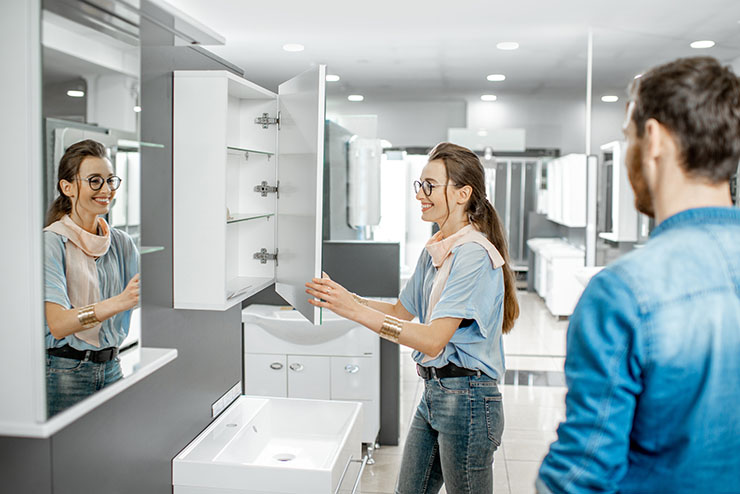
Bathroom renovation costs increased by 40% during the pandemic. And for most people, budgeting around £14,000 to redo their bathroom is no easy task. That’s why saving money, where possible, is a good idea, especially if you are planning on renovating other areas of your house as well.
Below are three easy tips to help you keep the costs down for your next bathroom renovation:
- Half-tile the walls. One of the most expensive elements of a bathroom renovation is tiling. To save money, you could half-tile your bathroom walls, and paint the rest. You’ll need to consider the cost of buying paint, and potentially hiring a painter (if you don’t want to DIY), but this will definitely be cheaper than the cost of buying and fitting a full wall of tiles.
- Dispose of items yourself. If you have the means to, disposing of your old bathroom items yourself will save you from having to pay the removal fee. In fact, you could even try and sell it, especially if it’s still in a decently good condition. Auction sites are a great place to sell your old fittings, allowing you to get back some of the money you are spending on your renovation.
- Keep the layout the same. Keep the layout the same. As you may have already gathered, moving things around leads to additional plumbing work that can make your project turn expensive, fast. If you can keep the general layout of your bathroom the same, this is the most important money-saving tip you should follow.
Lastly, always spend as much as you can afford to. A cheap alternative might look the same as a more expensive one, but cheap materials are more likely to age fast or crack. Buying better quality materials will always save you money in the long run.
Close section ↑How to design a good bathroom
Designing your bathroom might just be the trickiest part, especially if you’ve never done it before, or don’t have a clue where to begin.
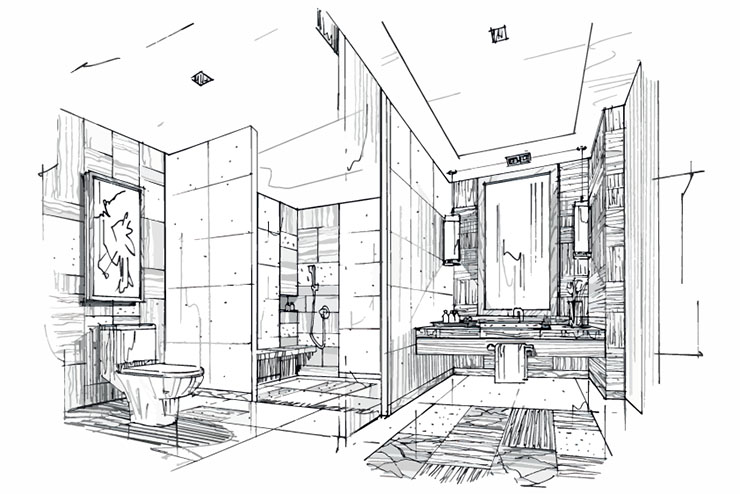
That’s why lots of people choose to hire a bathroom design specialist, as they prefer to feel in safe hands with a professional. Over at Rated People, you can find the right tradesperson to do the job for you.
It’s probably a good idea to have a general sense of what you might want your bathroom to look like. The below tips and benefits will help you decide on your perfect bathroom.
- Get rid of the grey!
Many people associate bathrooms with all-white or dark colour palettes like black and grey, but your bathroom can really benefit from a pop of colour. Colourful tiles or paint, as well as eye-catching accessories, can bring your bathroom to life.
Certain colours evoke particular feelings, like a calming blue, and can help you create the exact atmosphere you’re looking for. Picking a shade can be tough, though, considering the tons of options available. We recommend you look through some examples to find the right splash of colour for you.
Consider also:
- An ombre effect, where the colour gets gradually lighter
- Using stencils to add colourful patterns to your walls
- Match colours that are famously good together, such as black and gold
- Good lighting is your friend
The right lighting is important for the perfect bathroom design. Here, the key is pointing light in the right places, with lights that stand out and look stunning.
You might think that your lights are just there for a practical purpose, but the lights you choose can, in themselves, be decor. Turn your lights into custom pieces that draw the eye and elevate the overall design of your bathroom.
The internet is full of bathroom light ideas for you to make the most of. Hanging pendant lights are particularly popular.
Consider also:
- Making the most of your bathroom’s natural light, such as by installing an additional skylight
- Using “daylight” bulbs, “cool white” bulbs or “bright white” bulbs with colour temperatures of 5000K-6000K or 3500K-4100K, which are considered the best for bathrooms
- Add more mirrors, which spread light throughout the room (and make your bathroom seem bigger than it is)
- Opposites attract
Pairing different textures and materials can truly make your bathroom look unique. The trick to getting this right is making sure you don’t overdo it. To avoid this, stick to a specific colour/design palette, and don’t try to mix too many tones together.
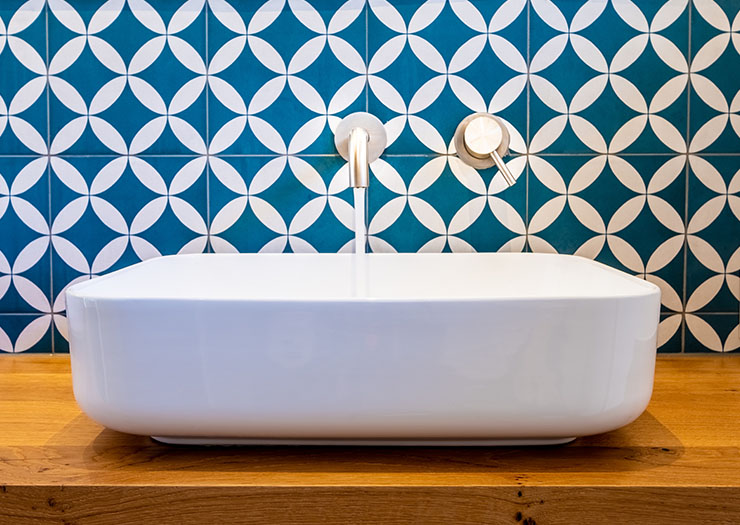
Doing this will also allow you to pair lower and higher price tag materials together. Wood and steel are a good combination, especially if you’re going for a minimalist design. In fact, wood creates a sense of warmth that looks good in many bathroom designs.
Consider:
- Mixing and playing around with different tile colours and designs, for a modern, trendy look
- Mix your metals for a contemporary look and feel
- Combine patterns and shapes, such as hexagonal mirrors and square tiles, to help your bathroom design stand out
What’s trending…
Sometimes, home improvement trends go viral, especially on social media. The below are some current decor trends that might inspire your new bathroom design…
- Herringbone floors
- Living walls
- Vintage furniture
- Pampas grass décor
- Neutral décor
- Maximalism
- Wall panelling
- Flagstone floors
- Painted arches
- Japandi décor
- Colour blocking
- Green walls
- Pink bathrooms
- Cottagecore décor
- Grand millennial décor
Conclusions
A new bathroom renovation isn’t cheap, though just how much you spend will depend largely on the size of your bathroom, and your budget for the project.
Keep in mind that these price ranges are a general estimate, and that each bathroom makeover is unique due to the condition of your plumbing and your vision for the renovation. If you live in the Southeast, expect to pay more to have your materials fitted.
Whether you spend £12,000 or £16,000 depends on the materials you select, and how many bathroom pieces you want to include in your bathroom. If you are looking for a luxury bathroom, then expect to pay upwards of £16,000 for the whole job. Either way, it’s entirely possible to have a new bathroom installed, even on a budget.
Get into contact with a professional tradesperson to find out just how much your renovation might cost you.
*The Rated People cost guides are produced in collaboration with the quote-building platform PriceBuilder, and a range of tradespeople across the 30+ trades on our platform were consulted. Please note that the prices included are for guidance only – how much you end up spending will depend on the specific requirements of your project.

